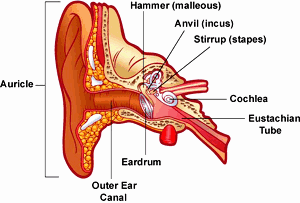Art For Children





Hearing Tips
Hearing And Speech
In the first few years of life, hearing is a critical part of a child’s social, emotional, and cognitive development.
Even a mild or partial hearing loss can affect a child's ability to speak and understand language. The earlier hearing loss occurs in a child's life, the more serious the effects on the child's development.
Possible Causes of Hearing Loss are:
Hearing loss is a common birth defect, affecting about 1 to 3 out of every 1,000 babies. A number of factors can lead to hearing loss, and about half the time, no cause is found.
Hearing loss can occur if a child:
-
was born prematurely
-
had high bilirubin and needed a transfusion
-
was given medications that can lead to hearing loss
-
has a family history of childhood hearing loss
-
had complications at birth
-
had frequent ear infections
-
had infections such as meningitis or cytomegalovirus
-
was exposed to very loud sounds or noises, even briefly
The earlier the problem is identified and intervention begins, the less serious the ultimate impact.
There are four major ways in which hearing loss affects children:
-
It causes delay in the development of receptive and expressive communication skills (speech and language).
-
The language deficit causes learning problems that result in reduced academic achievement.
-
Communication difficulties often lead to social isolation and poor self-concept.
-
It may have an impact on vocational choices
Hearing Test For Children
Children should have their hearing evaluated on a regular basis. Hearing tests can be done during the first week of a baby’s life for early detection of any problems and again before the child enters primary school.
Parent must pay a major role in helping to detect early hearing problems and in helping children to develop. Here are some of the things that you can do:
-
Check your child's ability to hear and pay attention to ear problems and infections, especially when they keep occurring.
-
Reinforce your baby's communication attempts by looking at him or her, speaking, and imitating his or her vocalizations. Repeat his or her laughter and facial expressions.
-
Teach your baby to imitate actions such as peekaboo and clapping, they teach turn taking that is needed for conversation.
-
Talk while you are doing things such as dressing and bathing. Talk about where you are going, what you will do once you get there, and who and what you'll see.
-
Talk about colours, practice counting - count toes and fingers, count steps as you go up and down them.
-
Teach animal sounds (e.g., "A cow says 'moo'").
Also See:
Speech and Language Therapist

Stages of Development
Birth–3 Months Birth–3 Months
-
Startles to loud sounds Makes pleasure sounds (cooing)
-
Quiets or smiles when spoken to . Cries differently for different needs
-
Seems to recognize your voice and quiets if crying.
-
Smiles when they see you
-
Increases or decreases sucking behavior in response to sound
4–6 Months 4–6 Months
-
Moves eyes in direction of sounds
-
Makes babbling sounds more speech-like with many different sounds, including p, b and m
-
Responds to changes in tone of your voice. Chuckles and laughs.
-
Notices toys that make sounds. Vocalizes excitement and displeasure.
-
Pays attention to music
-
Makes gurgling sounds when left alone and when playing
7 Months–1 Year 7 Months–1 Year
-
Enjoys games like peek-a-boo and pat-a-cake
-
Babbling has both long and short groups of sounds such as "tata upup bibibibi"
-
Turns and looks in direction of sounds.
-
Uses speech or non-crying sounds to get and keep attention
-
Listens when spoken to.
-
Uses gestures to communication (waving, holding arms to be picked up)
-
Recognizes words for common items like "cup", "shoe", "book", or "juice"
-
Imitates different speech sounds
-
Begins to respond to requests (e.g. "Come here")
-
Has one or two words (hi, dog, dada, mama) around first birthday, although sounds may not be clear
Noisy Toys
Some toys are so loud that they can cause hearing damage in children. When noisy toys are held directly to the ear, as children often do, they can actually expose the ear to a damaging dose of sound and can result in permanent hearing loss.
If you are concerned that your child seems to be having trouble hearing, or if the child's speech development seems abnormal or is difficult to understand contact a Hearing and Speech Therapist.
